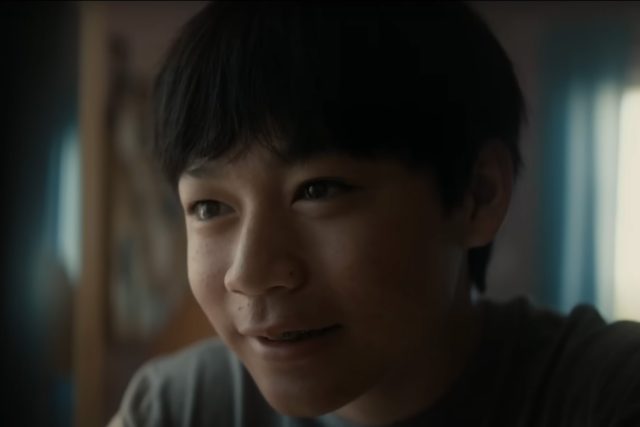[ad_1]
Director Sean Wang’s (debut) previous documentary work invites viewers to fully understand his subjects, building upon initial impressions to expand into nuances of their existence.
Wang’s Oscar-nominated documentary short “Nǎi Nai & Wài Pó” exemplifies this sentiment. Starting off as a cheerful montage of his paternal and maternal grandmothers’ daily lives together, the film later grows into a discussion of both their loneliness and their growing fear of anti-Asian hate during the early stages of the pandemic. By applying these same techniques to “Dìdi,” his first feature, he allows the viewer to understand the characters as they are. Main character Chris Wang’s (Izaac Wang, “Raya and the Last Dragon”) decisions are mostly questionable, but in “Dìdi,” there are no heroes or villains. It’s just Chris trying his (sometimes shitty) best, and Wang leaves it up to the viewer to judge his character after seeing every one of his ups and downs.
In the era of AOL Messenger, Taiwanese-American Chris is a socially inept middle school boy. His routine consists of messing around with his friends Fahad (Raul Dial, debut) and Jimmy (Aaron Chang, “In the Mood” ), getting into petty disagreements as the dìdi — younger brother — of his sister Vivian (Shirley Chen, “Beast Beast”) and being gently reprimanded by his mother, Chungsing (Joan Chen, “The Last Emperor”).
A central theme is Chris’s inability to maintain friendships, partially due to his subpar social skills. Chris’s social interactions play out so disastrously at times that it is frankly hard to watch. He recounts a story about flinging around a dead squirrel by its tail to Fahad and his new friends, much to everyone’s horror; his attempt to flirt with his crush is possibly the worst in movie history, after which Chris lies that they had sex; he lies to his cool skateboarding friends that he’s half-white and lashes out at his mom when she reveals that’s not true. In every situation in which it’s possible to make a social misstep, he does.
His character arc is reminiscent of Devi from “Never Have I Ever” and Lady Bird from “Lady Bird.” At first, it’s hard to watch these characters onscreen; they’re selfish, are constantly chasing social status at the expense of their friends or family and, quite frankly, are just not great people most of the time. They’re generally worse than the average on-screen teenager. But Wang isn’t going to leave out Chris peeing in Vivian’s skincare bottle to spite her, so he’s not going to leave out his insecurity over his introversion (hence his colorful squirrel story), his being an unpopular virgin (hence lying that he had sex with his crush) and his Asian heritage (hence his lie about being “Wasian”).
Chris is constantly trying to fit molds that he thinks would make him likable — comedic relief, skateboard filmer and cool nonvirgin — while diluting the parts of himself and his upbringing that he finds embarrassing. This even remains true down to his name. He begins introducing himself as Chris to his skater clique, as opposed to Wang Wang, which is what he used to go by with Fahad and Jimmy. He’s denying himself the possibility of more naturally constructing his place in the world.
His friends are similarly superficial. Chris is seen being excluded from Fahad and Jimmy’s conversation in the film’s first scene, stuck two paces behind them as soon as they spot each other. Fahad participated in the crazy squirrel ritual, yet refuses to come to Chris’s defense when he recounts the story. His skater friends only care that he takes good photos and stop talking to him completely after he messes up a singular shot in the footage. Middle school popularity is fickle, but that doesn’t make his friends’ unreliability completely justifiable.
The delicate construction of family sets the overarching tone of the film. Chungsing is shown facing her fair share of ire from her mother-in-law Nǎi Nai (Zhang Li Hua, “Nǎi Nai & Wài Pó”), despite Chris’s father being absent. She wants the best for Chris and Vivian, but Nǎi Nai blames her for Chris’s unruly behavior and Chris lashes out at her after he gets frustrated at his own ability to make friends.
In one such instance, Chungsing reprimands Chris after he punches Josh (Joziah Lagonoy, “Night Swim”), who laughs about his failed date with Madi. He sleeps at a playground overnight after the argument escalates. When he returns home the next day, he asks his mom whether she even cared that he ran away. She responds with a comforting hug and the very honest confession that being Chris’s mother is her dream. Like Lady Bird thanking Marion at the end of the film or Devi slowly resolving her grief and relationship with Nalini, Chris’s imperfect, slowly healing relationship with his mother is what rounds out the film and brings him to the conclusion that he shouldn’t keep molding himself into something he’s not.
“Dìdi” starts as a self-deprecating comedy but Wang’s willingness to dive deeper into the teenage experience gives his characters more complexity than usual coming-of-age tropes. Teenage angst appears trivial in retrospect, but seeing every moment of Chris’s successes and failures made it easier to empathize and relate to him. Wang has cemented his legacy among other coming-of-age movies.
Daily Arts Writer Kristen Su can be reached at krsu@umich.edu.
Related articles
[ad_2]
Source link











